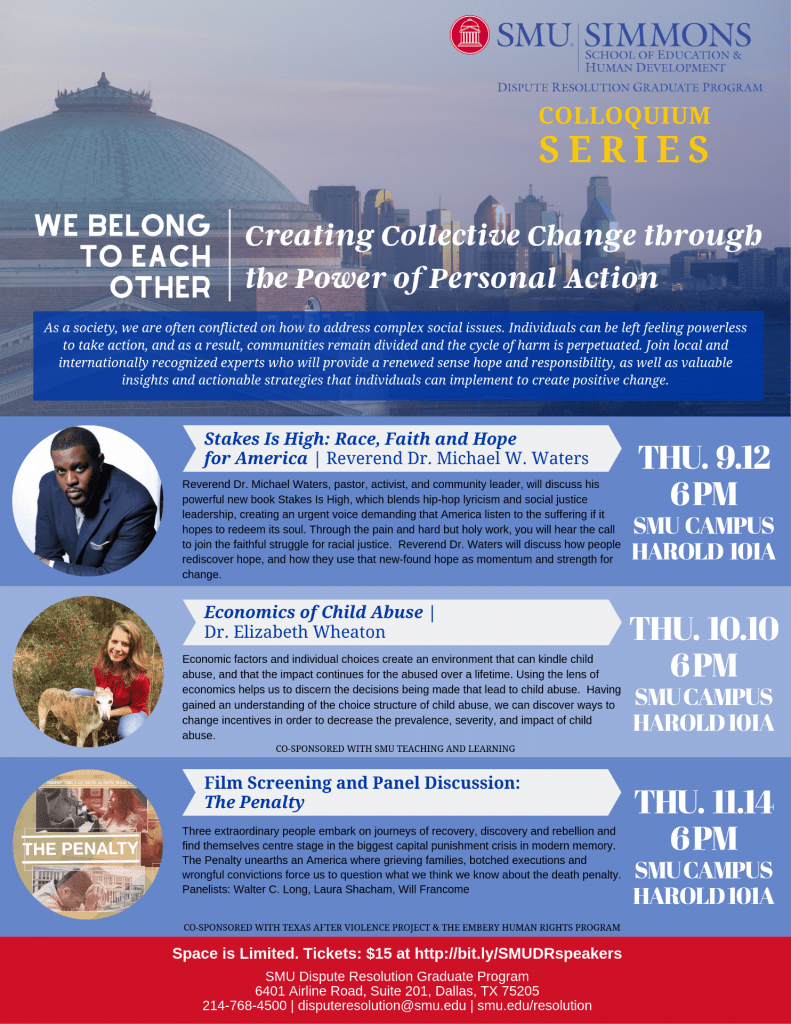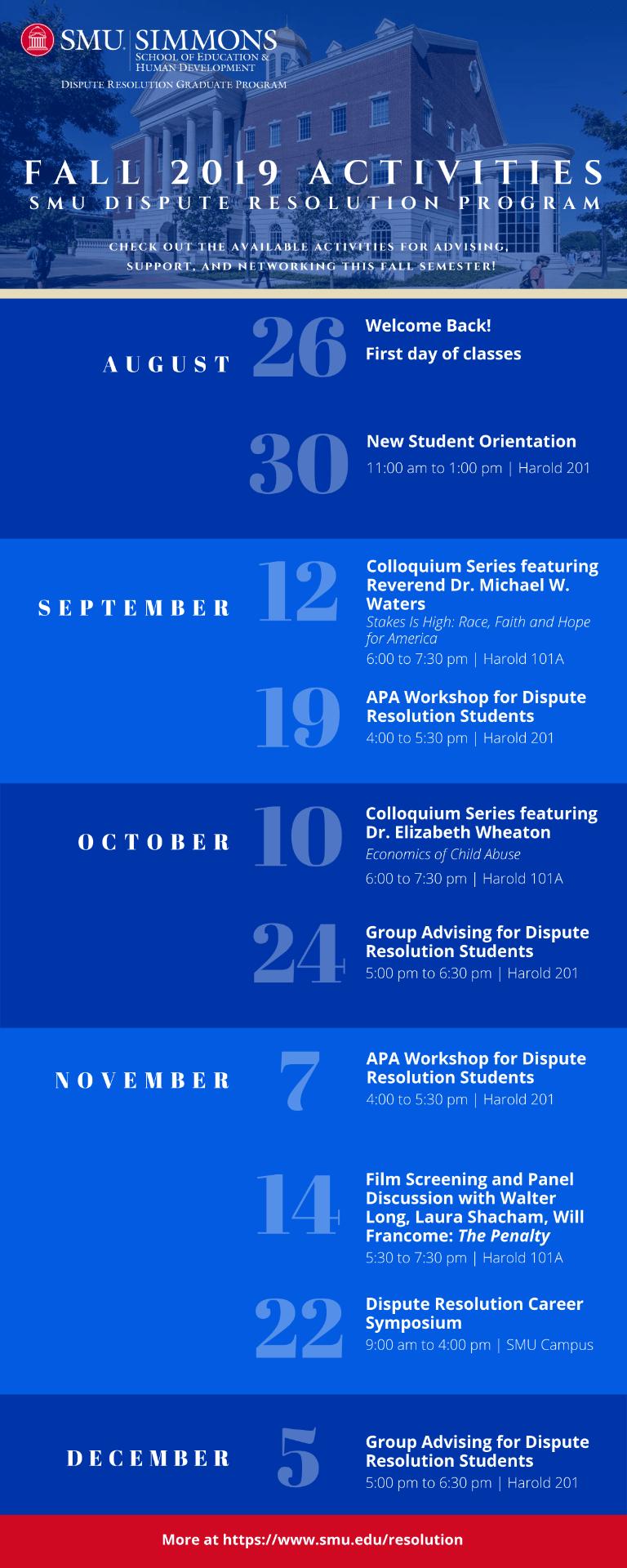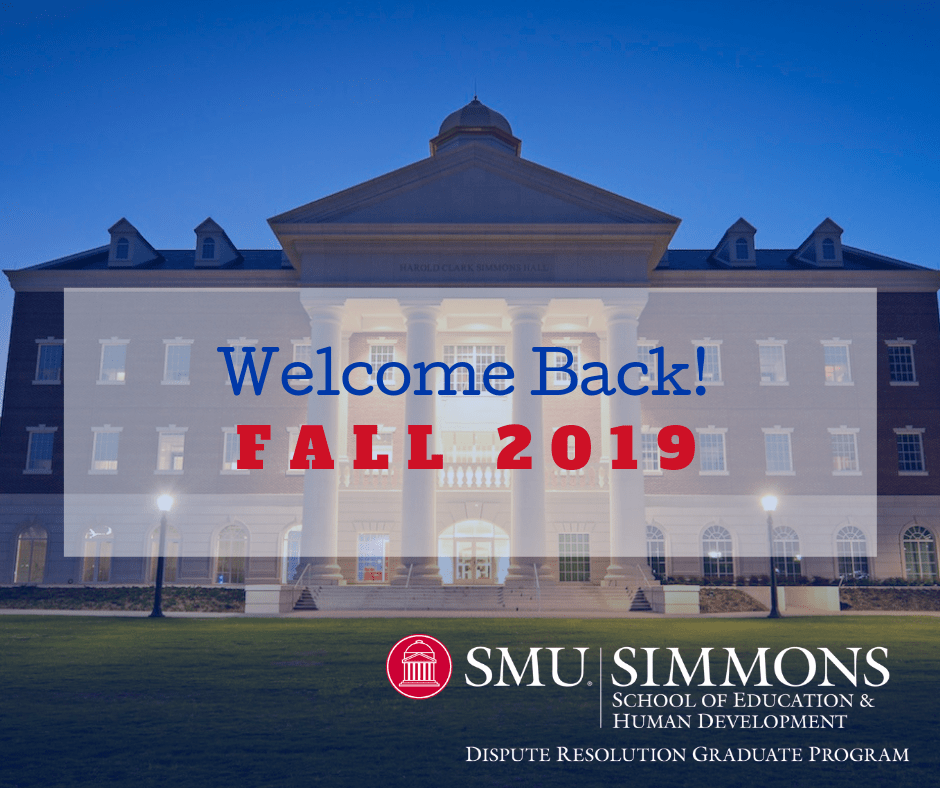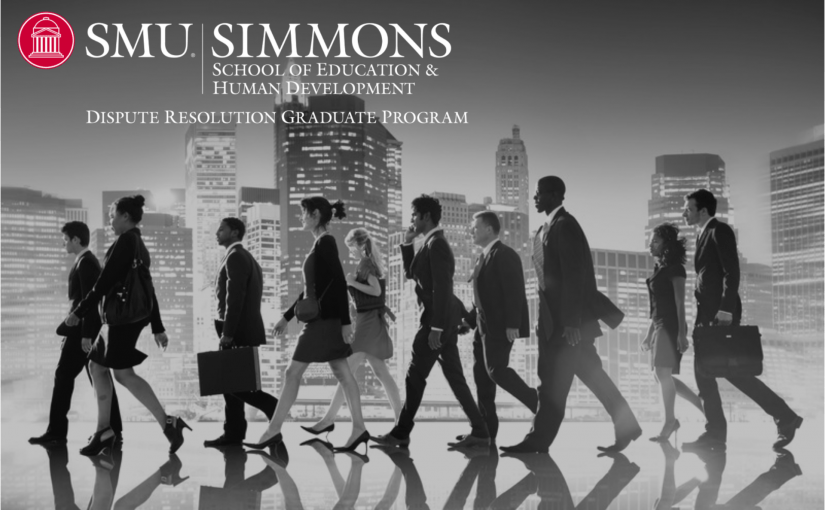SMU Dispute Resolution and Conflict Management Graduate Studies announces the featured colloquium speakers for the Spring semester. The colloquium series, “We Belong to Each Other: Creating Collective Change through the Power of Personal Action,” features local and internationally recognized experts who address complex social issues and provide actionable strategies to create positive change in the community. The first speaker, Imam Omar Suleiman, is scheduled for Thurs., March 26 at 6:00 pm. The second speaker, Yulise Reaves Waters, Esq., will speak on Thurs., April 23 at 6:00 pm. Tickets are $15 and can be purchased on the ticketing website.
SMU Dispute Resolution and Conflict Management Graduate Studies launches new colloquium series
SMU Dispute Resolution and Conflict Management Graduate Studies launches a new colloquium series this Fall semester. “We Belong to Each Other: Creating Collective Change through the Power of Personal Action” will feature local and internationally recognized experts who will address complex social issues and how individuals can implement actionable strategies to create positive change. The first speaker, Rev. Dr. Michael W. Waters, is scheduled for Thurs., September 12 at 6:00 pm. Tickets are $15 and can be purchased on the ticketing website.
Fall 2019 Activities for Dispute Resolution Students
Careers in Alternative Dispute Resolution: A Career Symposium – Nov. 30
Join us November 30th for Careers in Alternative Dispute Resolution: A Career Symposium.
This one-day event will provide a great opportunity for participants to narrow their career track, prepare for their job search and establish professional relationships! This event is open to anyone interested in learning more about careers in ADR. Please RSVP by November 26.
Symposium Agenda
| 8:30 a.m. | Networking Breakfast |
| 8:45 a.m. | “You are the CEO of your Career” Dr. Greta Davis |
| 9:30 – 11:00 a.m. | Opening Session Panel: Career Opportunities in ADR Across Sectors |
| 11:15 – 12:15 p.m. | Breakout Sessions Resume Writing – Dr. Bob Barner Maximizing Social Media for Your Success – Dr. Greta Davis & Dr. John Potter Embracing Your Career Potential – Jessica Lunce |
| 12:15 – 1:15 p.m. | Lunch |
| 1:15 – 2:45 p.m. | Maximizing Your Success In… Breakout Sessions Org Development – Dr. Bob Barner Independent Practice – Prof. Tom Hartsell & Prof. Angela Mitakidis Community & Peacebuilding – Dr. Betty Snyder |
| 3:00 – 4:00 p.m. | Developing Your Elevator Pitch Dr. Bob Barner |
| 4:10 – 5:00 p.m. | Closing Session |
Stay tuned for full agenda and session descriptions!
How to Make a Good (and Bad) Apology
SMU Dispute Resolution professor John Potter recently sat down with Justin Martin of KERA to discuss apologies and why are sometimes so difficult to make.
KERA News by Justin Martin
We’ve all made mistakes — it’s a part of being human. Apologizing for those mistakes is part of being human, too, but it’s not always easy.
We’ve seen an avalanche of apologies and pseudo-apologies made in the last few months — think Harvey Weinstein or Al Franken or, closer to home, Congressman Joe Barton.
SMU professor John Potter is an expert in dispute resolution and conflict management. He says to deliver an effective apology means considering what the person needs to hear rather than what you want to say.
“For most people when they apologize, they’re apologizing for themselves, saying they what want to say,” he says. “The key to an effective apology is saying what the person you’re apologizing to needs to hear — very different perspective.”
He says that disconnect can also lead to a bad, or ineffective, apology.
“We’re pretty sensitive to something when it doesn’t sound right and we just turn away from that person, when in fact, what that person really wants more than anything else is to be engaged, to be connected to the person they’re expressing regret to, so their relationship improves,” he says.
Potter says it’s easy to use an apology the wrong way and make things worse.
On how social media has changed the apology: “Social media changes everything when it comes to apology. Think of it this way: Imagine I write a book, it goes on a library shelf, and a hundred years from now, someone can find that book and read what I said. On the internet and in social media, that apology lasts forever and ever and ever, so if you don’t get the words in order correctly, if your words are not clear, if you’re ambiguous, then you have set yourself so far back you can’t recover. Clarity in a social media apology is paramount.”
On when you should make a face-to-face apology: “You should make a face-to-face apology when the relationship matters to you. If you’re my friend and we’ve been friends most of our lifetime, and I’ve done something harmful to you, this is not the time to send a text message. On the other hand, if we happen to work in the same building and I parked in your parking place and you’re mad at me, OK, a text message apology is just fine.”
On cultural differences in the apology: “There are cultural differences. Here is what I will normally will do in my own work: If I’m creating, writing, coaching someone on apology in a different culture, I’ll try and find an advocate in the culture to work with me, so I can go back and forth with that person to make sure the context is correct, make sure the tone is correct and that it’s more effective.”
Race & Reconciliation Symposium – April 7th
Join us April 7th for the Race & Reconciliation Symposium, presented by Peace is Possible.
The SMU Conflict Management and Dispute Resolution Center is partnering with Peace is Possible for this one-day event designed to educate and develop community leaders that are passionate about dismantling racial divisions within our society. Topics and activities include: presentations from academics and thought leaders, dialogue processes, and learning opportunities centered around the importance of personal narratives and how they enable common understanding within communities. Creating positive change starts with understanding the problems and a willingness to engage with them in meaningful ways. Many of the speakers live and work here in North Texas, and represent social justice efforts being carried out right here in DFW.
From the Peace is Possible website:
“The Symposium is designed to educate, motivate, and inspire positive change in the North Texas community. Participants will learn the importance of personal narratives as it relates to understanding the lived experiences of those individuals whose narratives are too often missing in history. Actionable ideas will be presented to help attendees begin to shift from consciousness awareness to being agents of positive change in their workplaces and communities. Participants will learn from thought leaders and academics, participate in dialogue processes, and, ultimately, have the opportunity to become peacemakers in our shared North Texas community.”
Registration for the event is $45, and includes a light breakfast and lunch. Come learn how to engage your community as a peacemaker, and create positive, equatable change at the Race & Reconciliation Symposium.
Continue reading “Race & Reconciliation Symposium – April 7th”
Want to enhance your career success in Dispute Resolution and Conflict Management? Try Change Management!
Original Blog Post by SMU DRCM Dr. Robert Barner
If you are in the DR program you already have a very credible knowledge base for helping others work through conflict. The only thing you lack is a structured set of tools for managing change.
So you are part way through the DR certificate or Master’s program and you are now starting to think about how you intend to apply your certificate or degree to your career. Are you planning to set up your own mediation or conflict management practice? Considering looking for a corporate job in HR, training, or a related field?
If you want to increase your chances for career success, perhaps it is time to consider broadening your tool belt a bit, starting by learning some skills in organizational change management. Let me explain.
For 30+ years I worked as a corporate executive in the HR sub-fields of organizational and leadership development. One of my big responsibilities in each of these positions was to help organizations think through the best way to manage change. In each of these situations another leader held the responsibility of being the project manager. These were the people who built the project plan, established milestones and cost estimates, and negotiated with vendors. But quite often these companies realized that change = conflict. Employees resist change when those changes are not clearly communicated, when there is little opportunity for employee input, and when there is no opportunity to coach leaders in how to effectively guide their teams through the change process. That is when they would approach me to offer suggestions and provide tools that would increase the chances that the organizational change might be successful.
And that’s where you come in. If you are in the DR program you already have a very credible knowledge base for helping others work through conflict. The only thing you lack is a structured set of tools for managing change.
Think about it this way…If you are setting up your own practice, you will probably be charging about $150 – 250/hour for your services, with a typical mediation service netting $400 -$800. A change management project typically takes 6 to 18 months, with a change manager contacted at a hefty rate to provide support at each stage of that project.
On the other hand, if you are NOT thinking about hanging out your shingle, you are probably considering exploring employment opportunities in HR or related professions. In this case, change management skills can be an invaluable means of separating you from the other job candidates. I know, because I operated at the VP level for the last 15 years of my corporate work experience, and hired many full-time and contract support professionals.
For all of these reasons I am inviting you to sign up for the next Organizational Change Management course I will be conducting through our program in the upcoming May Term 2018.
This course is only available only once a year, and the next course will be conducted in the weekends of May 11-13; 18-20 (with registration March 19-30). You can obtain additional information from Jessica Lunce, our Program Manager at jlunce@smu.edu.
The bottom line – don’t wait until you graduate to figure this out. If you have been wanting to expand your career horizons, then perhaps this is the “change” that you have been waiting for. Hope to see you there!
Apologizing the Right Way
Originally Posted: January 2, 2018
SMU Dispute Resolution professor John Potter sits down with FOX 4’s Dan Godwin to share tips on what we should think about before we say apologize.
SMU Dispute Resolution students and guests share insights from Rwanda experience
SMU Dispute Resolution faculty, students and guests, in collaboration with ALARM (African Leadership and Reconciliation Ministries), recently traveled to Rwanda to deliver peacebuilding and peer mediation training. After returning to Texas, the group shares their individual experiences with the Rwandan people and insights on what we could all learn about peace.
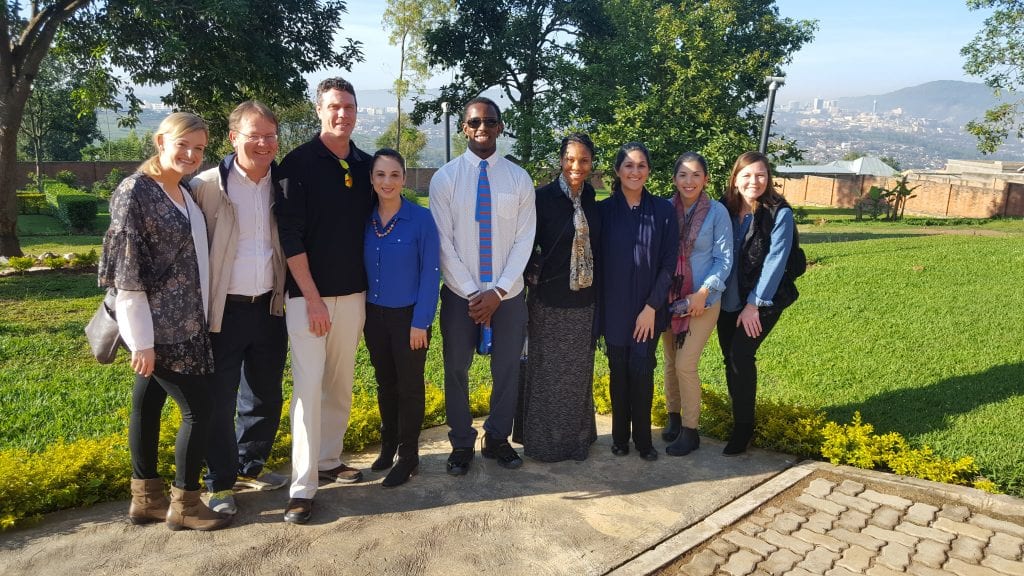
Dr. Betty Gilmore, SMU Dispute Resolution Program Director
“I believe that we learned more from the Rwandan people than they learned from us. Despite unthinkable adversity, there are many areas in which the country is thriving. The entire nation has committed to sustainable peace.
What touched me most was the resilience of the human spirit and the ability of people who have caused such harm to each other to come together to rebuild a nation. I hope that we can all learn from the gift they have given us with their example. If a country learning to forgive under such extreme conditions can heal, why can’t we? We must put aside our differences, look for the things that unite us, and realize that we are better together.”
To read more about Dr. Gilmore’s experience, visit: http://www.smu.edu/News/2017/betty-gilmore-rwanda-18april2017
Ashley Aguilar, MA Dispute Resolution, Class of 2017
“I have never witnessed selflessness like I did in Rwanda. This quality was exhibited by everyone I encountered. Every person was more concerned about the well being of those surrounding them, than that of themselves. I’ve seen people with this quality before, but never have a seen this in everyone surrounding me on such a large scale. The Rwandan people have shown me what it truly means to live selflessly. We could use selflessness to build peace here. If we could teach more people the benefits of perspective taking and vulnerability and shift the paradigm, then I think selfless acts and decisions could follow. Imagine living each day for something more than just yourself. I felt blessed to be a part of it.”
Elizabeth Blake, MA Dispute Resolution, Class of 2017
“The Forgiveness Villages in Rwanda in which victims and perpetrators of the 1994 genocide live and work together were by far the most bold and courageous systems of peace and reconciliation implemented in country. Our group was able to visit one of the Forgiveness Villages in Nyamata, Rwanda to hear testimony from victims and perpetrators. They use civil discourse processes as a means speak their truth, share their personal narratives, hear testimony of victims AND perpetrators, and work toward peaceful resolution, and ultimately forgiveness and repentance.
Americans generally do not participate in civil discourse as a means to understand other perspectives, and American media tends to promote political and social polarization. Hatred and division have become the norm in American culture. Civil discourse involves great courage, compassion, and desire to understand the other person. Rwandans have mandated conflict resolution curriculum in schools as a means to teach children from a young age how to listen for understanding, show compassion for the other, and resolve conflict in their families and communities. Imagine the compassion, tolerance, and cohesion the next generation of Americans would have if we started teaching them conflict resolution when they first start school. Imagine the possibilities!” Continue reading “SMU Dispute Resolution students and guests share insights from Rwanda experience”


